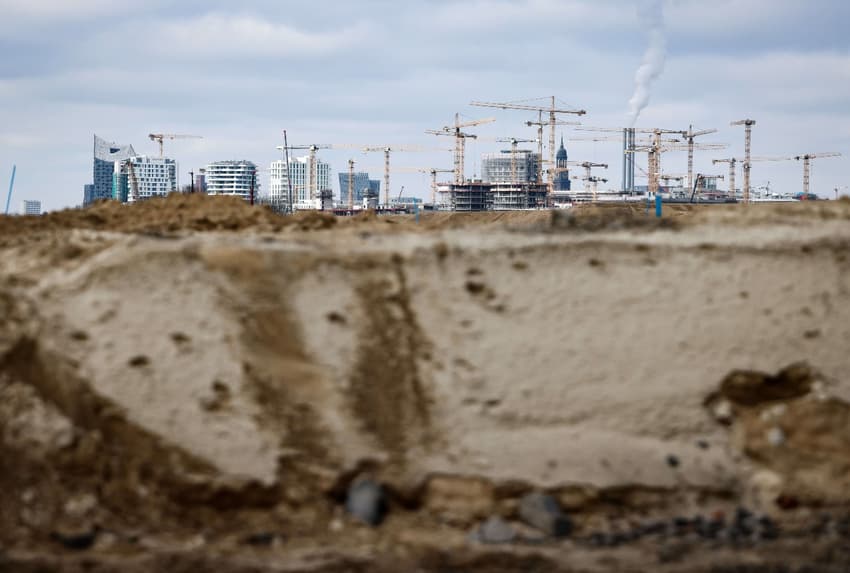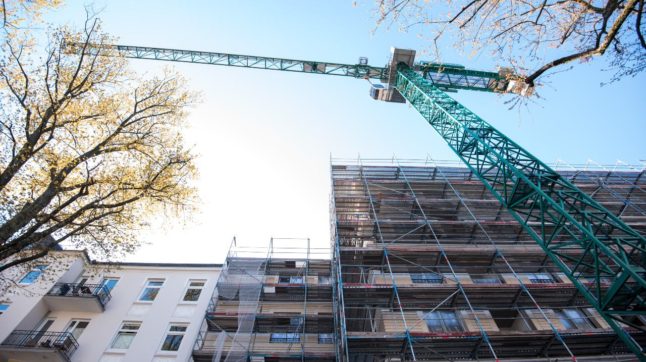Why does Germany keep missing its house-building targets?

The German government had grand plans to build 400,000 new homes a year - but it keeps falling short of its targets. Here's what's going on.
Looking to move? Find your next rental apartment here.
Back in 2021, a cornerstone of the Social Democrats' election campaign was the pledge to ease the housing crisis by building hundreds of thousands of new properties per year. Of these, at least 100,000 would be earmarked as affordable homes.
This promise was written into the coalition pact between the Social Democrats (SPD), Greens and Free Democrats (FDP), and the new ministerial post of 'Housing Minister' was set up in the federal government.
Since then, these promises have failed to come to fruition: in 2022, around 290,000 new homes were built, and the Federal Association of German Housing and Real Estate Companies (GdW) now predicts that this will drop to 280,000 new homes in 2023.
READ ALSO: Why Germany is seeing the 'worst housing shortage in 20 years'
As construction firms and political grandees gather together for the annual 'Housing Construction Day' conference on Thursday, it's likely to be overshadowed by this ever-growing backlog.
Why is so hard to build homes right now?
According to GdW president Axel Gedaschko, the problems are multi-faceted - but a lot of comes down to affordability.
Due to supply bottlenecks and the war in Ukraine, the cost of building materials is soaring at the moment, with increases of 60 or 70 percent in some cases, he said.
This is compounded by high interest rates for construction loans - which is how many companies finance their building projects. These interest rate increases, combined with the difficulties of accessing subsidies, mean that some projects are only considered viable if the apartments can be rented out for €15 and €20 per square meter - before utilities and other costs.
Since these prices are well out of many tenants' price range, a lot of building projects have had to be put on hold for the time being, Gedascko explained.
In addition, companies complain that the procedures for gaining approval for new construction projects are long and overly bureaucratic. They also say they lack the workers they need to build at a rapid pace.
READ ALSO: REVEALED: The German industries most desperate for skilled workers
Is it possible for the government to hit its targets?
Klara Geywitz (SPD), the Federal Housing Minister, certainly seems to think so.
Countering Gedaschko's concerns, Geywitz said the supply bottlenecks of the past year had largely been eliminated, adding that craftsmen were now more readily available and government subsidy programs were helping to counter higher financing costs.
"We have to produce more with the same number of people on the construction sites, otherwise we simply won't manage to reduce this construction backlog," she said. "That means we not only have to subsidise, but we also have to standardise: serial pre-production, digitalisation - in order to then get to these numbers that we need."

New-build flats in Hamburg. Photo: picture alliance/dpa | Daniel Bockwoldt
With quicker building methods and approval, Geywitz believes the government can not only reach its building targets but potentially catch-up on previous ones.
That's particularly because there are currently 800,000 new homes that have been approved for construction, but simply haven't been built yet.
For the liberal FDP, the answer to the problem also lies in more standardised construction and accelerated approval procedures. At the Housing Construction Day on Wednesday, FDP parliamentary group leader Christian Dürr said that federal states should unify their application processes and that it should be easier for private builders to finance construction projects.
READ ALSO: Ask an expert: Is now a good time to buy property in Germany?
How do building companies want to deal with the issue?
Unsurprisingly, the construction industry is calling for more government money to be poured into their companies. But ministers are conspicuously reticent in the face of demands for a substantial increase in subsidies.
"Against the background of the federal budget, which will be tight enough for all the important things we are doing in education, in defence, I am very much against putting new money in the shop window now," said Dürr, adding that existing subsidies should be easier to get hold of.
"On the other hand, we have to get to grips with the regulations ourselves so that building doesn't become more expensive," he said.
This is unlikely to go down well with the attendees of Housing Construction Day, which is organised by the construction and real estate industries alongside major landlords.
Most recently, they've predicted that just 200,000 new dwellings could be completed next year if politicians do nothing to curb further price increases in construction.
The organisers of Housing Construction Day continue to prophesy a catastrophic decline in housing, even in their advertisements for the event, where they claim that the housing market is "at an end".
Comments (1)
See Also
Back in 2021, a cornerstone of the Social Democrats' election campaign was the pledge to ease the housing crisis by building hundreds of thousands of new properties per year. Of these, at least 100,000 would be earmarked as affordable homes.
This promise was written into the coalition pact between the Social Democrats (SPD), Greens and Free Democrats (FDP), and the new ministerial post of 'Housing Minister' was set up in the federal government.
Since then, these promises have failed to come to fruition: in 2022, around 290,000 new homes were built, and the Federal Association of German Housing and Real Estate Companies (GdW) now predicts that this will drop to 280,000 new homes in 2023.
READ ALSO: Why Germany is seeing the 'worst housing shortage in 20 years'
As construction firms and political grandees gather together for the annual 'Housing Construction Day' conference on Thursday, it's likely to be overshadowed by this ever-growing backlog.
Why is so hard to build homes right now?
According to GdW president Axel Gedaschko, the problems are multi-faceted - but a lot of comes down to affordability.
Due to supply bottlenecks and the war in Ukraine, the cost of building materials is soaring at the moment, with increases of 60 or 70 percent in some cases, he said.
This is compounded by high interest rates for construction loans - which is how many companies finance their building projects. These interest rate increases, combined with the difficulties of accessing subsidies, mean that some projects are only considered viable if the apartments can be rented out for €15 and €20 per square meter - before utilities and other costs.
Since these prices are well out of many tenants' price range, a lot of building projects have had to be put on hold for the time being, Gedascko explained.
In addition, companies complain that the procedures for gaining approval for new construction projects are long and overly bureaucratic. They also say they lack the workers they need to build at a rapid pace.
READ ALSO: REVEALED: The German industries most desperate for skilled workers
Is it possible for the government to hit its targets?
Klara Geywitz (SPD), the Federal Housing Minister, certainly seems to think so.
Countering Gedaschko's concerns, Geywitz said the supply bottlenecks of the past year had largely been eliminated, adding that craftsmen were now more readily available and government subsidy programs were helping to counter higher financing costs.
"We have to produce more with the same number of people on the construction sites, otherwise we simply won't manage to reduce this construction backlog," she said. "That means we not only have to subsidise, but we also have to standardise: serial pre-production, digitalisation - in order to then get to these numbers that we need."

With quicker building methods and approval, Geywitz believes the government can not only reach its building targets but potentially catch-up on previous ones.
That's particularly because there are currently 800,000 new homes that have been approved for construction, but simply haven't been built yet.
For the liberal FDP, the answer to the problem also lies in more standardised construction and accelerated approval procedures. At the Housing Construction Day on Wednesday, FDP parliamentary group leader Christian Dürr said that federal states should unify their application processes and that it should be easier for private builders to finance construction projects.
READ ALSO: Ask an expert: Is now a good time to buy property in Germany?
How do building companies want to deal with the issue?
Unsurprisingly, the construction industry is calling for more government money to be poured into their companies. But ministers are conspicuously reticent in the face of demands for a substantial increase in subsidies.
"Against the background of the federal budget, which will be tight enough for all the important things we are doing in education, in defence, I am very much against putting new money in the shop window now," said Dürr, adding that existing subsidies should be easier to get hold of.
"On the other hand, we have to get to grips with the regulations ourselves so that building doesn't become more expensive," he said.
This is unlikely to go down well with the attendees of Housing Construction Day, which is organised by the construction and real estate industries alongside major landlords.
Most recently, they've predicted that just 200,000 new dwellings could be completed next year if politicians do nothing to curb further price increases in construction.
The organisers of Housing Construction Day continue to prophesy a catastrophic decline in housing, even in their advertisements for the event, where they claim that the housing market is "at an end".
Join the conversation in our comments section below. Share your own views and experience and if you have a question or suggestion for our journalists then email us at [email protected].
Please keep comments civil, constructive and on topic – and make sure to read our terms of use before getting involved.
Please log in here to leave a comment.